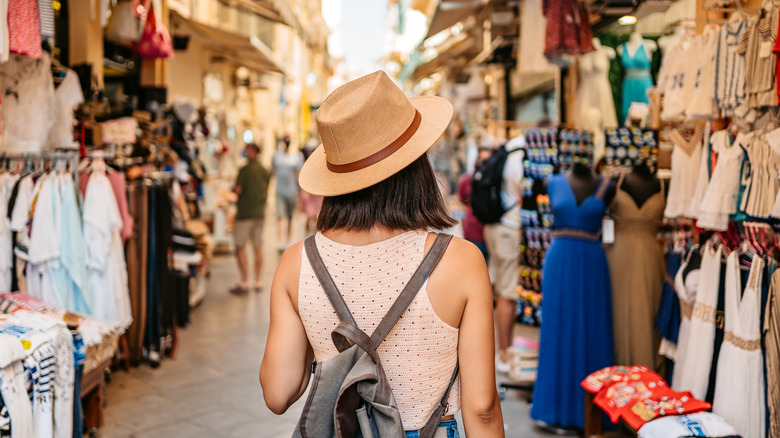Important Budgeting Tips To Keep In Mind When Traveling Solo
Traveling solo and loving it may be trending, but those who go it alone know it isn't always easy. While solo travel gives you more freedom and flexibility than traveling with a companion, it can often be more expensive. It's up to you and only you to foot the bill, pay for any accidents or emergencies that arise and cover the cost of things that are sometimes priced for two people. To be a successful solo traveler, some planning and careful budgeting are paramount.
One of the first things solo travelers should consider when organizing a trip is where they'll stay, especially given that accommodations can be pricey for single guests. Hotels, for instance, are often priced per room, not per guest, so you'll pay double what you would if you traveled with a friend or partner. Cruise ships also commonly charge single supplements for cabins, where solo sailers must pay extra for having a room to themselves. To save money, look for solo traveler-friendly accommodations, such as hostels and capsule hotels. You may even find a host family or homestay in your destination, which helps cut costs while offering cultural immersion.
There are other expenses that quickly add up when there's no one to split them with. Taxi rides, for example, are costly in some cities, so you may want to prioritize public transportation and even bike and scooter rentals. Meals can also get expensive, especially if you want to sample multiple dishes by yourself. One tip: Don't eat out for every meal. Choose a handful of splurge-worthy dining spots to hit up during your trip, and during other meals, grab prepared food at the supermarket or cook your own food.
Watch out for costly activities when traveling solo
While globe-trotting solo, you'll likely realize that some activities, especially those operated by a tour company, can be more expensive for single participants than couples or groups. To avoid blowing through your travel budget, choose experiences that welcome solo travelers. Free walking tours are a great alternative, as are free admission days at museums and outdoor attractions that don't require an entrance ticket. Try using these helpful tools to help you find free tours and attractions in your destination.
You might also want to keep shopping to a minimum during your trip. Browsing the local stores without the distraction of a travel companion can be a fun way to pass the time, but, for obvious reasons, it's smart to cap your purchases if you have limited funds. Moreover, you're the only person responsible for bringing your goods back home. Unless you ship your items — which may also be pricey — you'll have to squeeze your purchases in your suitcase, which could mean having to pay more for luggage. Commit to only buying what can reasonably fit in the suitcase you arrived with, and set a strict limit on discretionary spending to curb impulse shopping.
Easy ways to save money on any trip
No matter how many people are in your booking, there are a few travel hacks that almost always save money. That said, these tips may be even more important if you're jet-setting alone. For example, it's wise to only travel in the off-season or shoulder season to beat the crowds and score more competitive airfares. Similarly, it's best to book flights, buses, and train tickets for unpopular times, such as early in the morning, when prices are often the lowest.
If you're not picky about your destination, try sticking to places where your country's currency goes the furthest. For instance, the U.S. dollar is known to be strong in countries such as Vietnam, Japan, and Argentina. To avoid spending money at all, try racking up credit card points that can be used for hotel stays and other travel expenses. Finally, remain flexible during your getaway. You might be able to snag a single discounted seat at an event or discover an inexpensive street food spot you couldn't have planned for in advance. Be prepared to change your itinerary as needed as you stumble upon deals.


